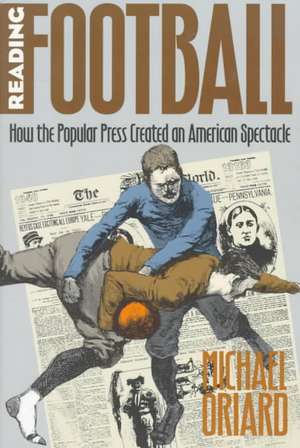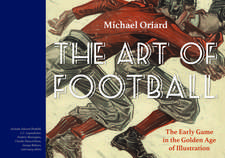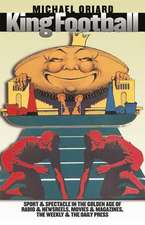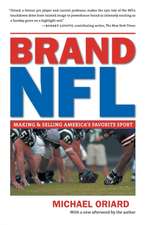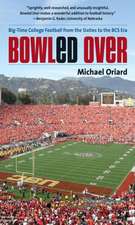Reading Football: How the Popular Press Created an American Spectacle: Cultural Studies of the United States
Autor Michael Oriarden Limba Engleză Paperback – 31 iul 1998
Preț: 341.27 lei
Nou
Puncte Express: 512
Preț estimativ în valută:
65.36€ • 67.34$ • 54.75£
65.36€ • 67.34$ • 54.75£
Carte tipărită la comandă
Livrare economică 22 februarie-08 martie
Preluare comenzi: 021 569.72.76
Specificații
ISBN-13: 9780807847510
ISBN-10: 0807847518
Pagini: 352
Dimensiuni: 157 x 236 x 25 mm
Greutate: 0.54 kg
Editura: University of North Carolina Press
Seriile Cultural Studies of the United States, Cultural Studies of the United States (Paperback)
ISBN-10: 0807847518
Pagini: 352
Dimensiuni: 157 x 236 x 25 mm
Greutate: 0.54 kg
Editura: University of North Carolina Press
Seriile Cultural Studies of the United States, Cultural Studies of the United States (Paperback)
Textul de pe ultima copertă
Is football an athletic contest or a social event? Is it a game of skill, a test of manhood, or merely an organized brawl? Michael Oriard asks these and other intriguing questions in Reading Football, the first contemporary book-length study of football's formative years. American football began in 1870s as a game to be played, not watched. Within a brief ten years, it had become a great public spectacle with an immense following. Not coincidentally, Oriard argues, football's formative years were also the golden age of print, an era when newspapers and periodicals reached a larger and more varied audience than ever before. These publications carried vast amounts of commentary about football conducted by journalists, coaches, ministers, college presidents and faculty, and various others. The daily newspaper in particular, Oriard argues, virtually created football as a popular spectacle. Oriard shows how this constant narrative developed many different stories about what the game meant: football as pastime, as the sport of gentlemen, as a science, as a game of rules and their infringements, as Darwinian struggle. He shows how football, in its early years, became a series of cultural stories about power, luck, strategy, and deception. These narratives, or interpretations, Oriard contends, often contradicted one another: they were read differently by different groups and individuals, and the various interpretations of the game changed through time. One question played out in the early years of football was this: Is football a game of brutality or a game that calls on the "manly" virtues of self-discipline, patience, bravery, and teamwork? Walter Camp, the Yale coach who is known as thefather of American football, wanted it to be seen as a game of discipline, obedience, pluck, and tactical genius - a mirror of corporate America. But the public cared more for "individual brilliancy", and football was increasingly described in print as brutal and barbarous as the game became more professional than collegiate. These different narratives of football, developed during the sport's formative years, have been magnified by football's current omnipresence on network television. According to Oriard, televised football now plays a cultural role of enormous importance for men, yet within the field of cultural studies the influence of football has been ignored until now.
